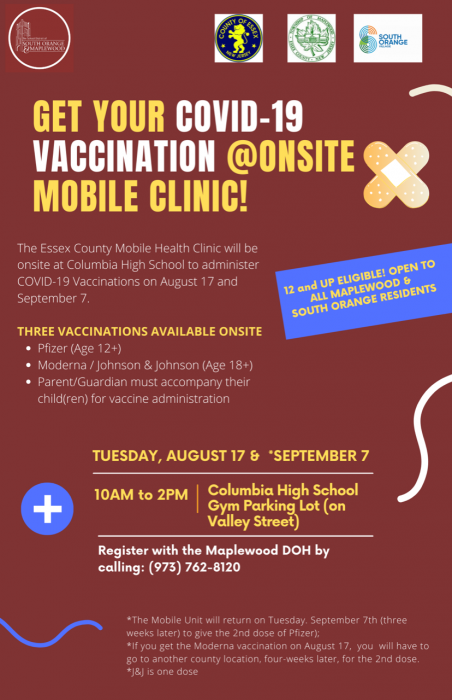NJ COVID deaths in spite of vaccination. 39 out of 4.8 million
joan_crystal said:
Story is behind a pay wall.
Skip to ArticleSet weatherKAAccount
News you need. Stories you care about. The source you trust. Start today for $1.
49 people who were fully vaccinated have died of COVID in N.J. Here’s what we know.
Updated Jul 25, 2021; Posted Jul 21, 2021

More than half of so-called "breakthrough" COVID deaths were people who had underlying conditions. (Ed Murray | NJ Advance Media for NJ.com)Ed Murray | NJ Advance Media for NJ.com
Facebook ShareTwitter Share12,656sharesBy Karin Price Mueller | NJ Advance Media for NJ.com
There have been 49 fully vaccinated people in New Jersey who have died from the coronavirus through July 12, state health officials told NJ Advance Media on Wednesday.
More than half of those who died had at least one underlying medical condition, according to Donna Leusner, a spokeswoman for the state Department of Health.
The number of deaths has increased since Gov. Phil Murphy announced on Monday that there had been 31 fully vaccinated people who died of COVID through June 28. The latest number includes cases through July 12, the latest data available, Leusner said.
All of the deaths were people over age 50, with 30 of them over age 80. Thirteen of the deaths were people between the ages of 65 and 79, and six were between the ages of 50 and 64, Leusner said.
Of the 27 deaths of people with underlying conditions, 17 had cardiovascular disease, seven had diabetes and nine had cancer or other immunocompromised conditions, she said. Five had chronic lung conditions, three had chronic kidney disease, one had chronic liver disease and five others are listed as “other chronic diseases.” Some of the people who died had more than one underlying condition.
Data about whether any of the people who died were nursing homes residents was not available.
“It is important to point out that 49 deaths due to COVID-19 among 4.8 million fully vaccinated state residents is slightly greater than one in 100,000 fully vaccinated individuals,” said state communicable disease service medical director Ed Lifshitz. “That means vaccines are about 99.999% effective in preventing deaths due to COIVD-19.”
While those who are most at risk of death from COVID-19 are unvaccinated people with underlying conditions, fully vaccinated people with underlying conditions will remain at risk as long as a large part of the population is unvaccinated, said Perry Halkitis, dean of the Rutgers School of Public Health.
“The solution to our problems both in terms of stopping the deaths and also stopping the spread of the disease depends on increasing the percentage of the population who are vaccinated,” Halkitis said. “But we have the flu vaccine in 59% of people. Why do we think we’re going to get higher than that with COVID-19?”
“But we have to get higher than that. It’s got to be better,” he added.
More than 5.18 million people who live, work, or study in New Jersey have now been fully vaccinated, according to state data. There are more than 9 million residents in the state, including children under the age of 12 who are not yet eligible to be vaccinated.
About 70% of the eligible population is vaccinated in New Jersey, ranking about 7th in country, according to CDC data.
If more people don’t get vaccinations, Halkitis said, he expects new restrictions in the months to come because “unvaccinated people are placing themselves and all of us at risk.”
Please subscribe now and support the local journalism YOU rely on and trust.
NJ Advance Media staff writer Brent Johnson contributed to this report.
Karin Price Mueller may be reached at KPriceMueller@NJAdvanceMedia.com.
Powered by Advance 360 Insights
NYT yesterday had a summary of data on death and hospitalization rates among vaccinated and unvaccinated in each state since the vaccine rollout. In NJ, the rate of hospitalization per 100K residents for unvaccinated people is 126 times higher than the rate for vaccinated. And that rate for the unvaccinated is 948 per 100K. Almost one percent of the unvaccinated in this state have been sick enough with COVID to be hospitalized!
It truly is a self-defeating choice. I know there are people saying we shouldn't call them stupid or selfish. So OK, let's not use those words. But I think it should be ok to tell them they're playing Russian roulette with their health, shouldn't it?
https://www.nytimes.com/interactive/2021/08/10/us/covid-breakthrough-infections-vaccines.html
FYI, if you start to highlight before the paywall comes up you can drag the highlight down and still copy and paste into Word or any other document software....
4.8 million out of 9.4 million NJ residents is 51 % of the total population including kids under 12
“It is important to point out that 49 deaths due to COVID-19 among 4.8 million fully vaccinated state residents is slightly greater than one in 100,000 fully vaccinated individuals,” said state communicable disease service medical director Ed Lifshitz. “That means vaccines are about 99.999% effective in preventing deaths due to COIVD-19.”
Doesn’t this statistic assume that every vaccinated person has subsequently been exposed to the virus? Kinda misleading…
With some people infected with COVID - 19 being asymptomatic and still able to spread the disease, unless you have remained in total isolation for the past 20 months, it is highly likely that you could have been exposed to COVID - 19 at some point. Vaccination does not prevent exposure. Wearing a face covering, social distancing, good hygiene, and avoiding crowds help with that; but, are not 100% effective. Vaccination does not offer 100% protection against infection either. Vaccination helps prevent serious infection that could lead to hospitalization or death from COVID - 19. With the emergence of new variants such as Delta and Lambda, the number of fully vaccinated people who contract COVID - 19 is going to increase. We all need to recognize this and act accordingly.
For me, the only really informative stats right now are those that focus on the Delta phase. Stats that cover the whole vaccination era are unfortunately too sunny. Breakthrough cases, as a percentage of new cases, are clearly up. I want to know the extent to which that is translating into a higher percentage of serious cases among the vaccinated.
Based on ominous predictions from Israel about where they are heading, I think our people have to consider a booster sooner rather than later, even if its just a 3d dose of what we've already gotten.
bub said:
For me, the only really informative stats right now are those that focus on the Delta phase. Stats that cover the whole vaccination era are unfortunately too sunny. Breakthrough cases, as a percentage of new cases, are clearly up. I want to know the extent to which that is translating into a higher percentage of serious cases among the vaccinated.
Based on ominous predictions from Israel about where they are heading, I think our people have to consider a booster sooner rather than later, even if its just a 3d dose of what we've already gotten.
I would like to know if we have statistics by type of vaccine for these breakout cases, especially those that resulted in hospitalization or death. Is the rate different for those who received the one dose vaccine rather than one of the two dose alternatives? Has there been a real difference in performance between the Pfizer and Moderna vaccines?
joan_crystal said:
bub said:
I would like to know if we have statistics by type of vaccine for these breakout cases, especially those that resulted in hospitalization or death. Is the rate different for those who received the one dose vaccine rather than one of the two dose alternatives? Has there been a real difference in performance between the Pfizer and Moderna vaccines?
I think the reports are too tentative and inconsistent right now. There seems to be agreement that one does is far less effective than two vs. Delta. A very recent study says Moderna is somewhat better than Pfizer vs. Delta.
the statistic people should pay attention to is the fact that about 99% of the hospitalized are NOT vaccinated. if that doesn't prove the vaccine helps a lot to people, nothing will get them to understand.
joan_crystal said:
I would like to know if we have statistics by type of vaccine for these breakout cases, especially those that resulted in hospitalization or death. Is the rate different for those who received the one dose vaccine rather than one of the two dose alternatives? Has there been a real difference in performance between the Pfizer and Moderna vaccines?
Candice Davenport just got back to me. Her answer to the above question is that this information is not currently available.
jimmurphy said:
“It is important to point out that 49 deaths due to COVID-19 among 4.8 million fully vaccinated state residents is slightly greater than one in 100,000 fully vaccinated individuals,” said state communicable disease service medical director Ed Lifshitz. “That means vaccines are about 99.999% effective in preventing deaths due to COIVD-19.”
Doesn’t this statistic assume that every vaccinated person has subsequently been exposed to the virus? Kinda misleading…
he could have just said that thus far 99.999% of vaccinated people haven't died of a COVID infection and been accurate. As with anything ongoing, the "thus far" is pretty important.
jmitw said:
the statistic people should pay attention to is the fact that about 99% of the hospitalized are NOT vaccinated. if that doesn't prove the vaccine helps a lot to people, nothing will get them to understand.
That 99% figure is for the whole vaccination era, not the current, Delta era. For example as of, July 26, 3% of those hospitalized in NJ were breakthrough cases. Not terrible but 3 time worse than the above number. Has it gotten worse in the last couple of weeks? I don't know but I want to.
bub said:
That 99% figure is for the whole vaccination era, not the current, Delta era. For example as of, July 26, 3% of those hospitalized in NJ were breakthrough cases. Not terrible but 3 time worse than the above number. Has it gotten worse in the last couple of weeks? I don't know but I want to.
there are far, far more vaccinated people in NJ since April 19 than there were before. More vaccinated people, less unvaccinated can lead to a higher % of breakthroughs even if they aren't more likely among the vaccinated.
ml1 said:
It truly is a self-defeating choice. I know there are people saying we shouldn't call them stupid or selfish. So OK, let's not use those words. But I think it should be ok to tell them they're playing Russian roulette with their health, shouldn't it?
"Russian roulette" I would tell them that some of the anti-vacs info on the net may have originated in Russia.
I just read that 13% of current hospitalizations in Colorado are breakthrough cases.
I would rather get clear stats every day than talking points. I don't need to be told every day that its better to be vaccinated. We need the facts on the ground. Last night I was at the second of two enclosed space events with decent crowds and virtually no one was masked at either. People need to know the facts to adjust their behavior if necessary.
bub said:
I just read that 13% of current hospitalizations in Colorado are breakthrough cases.
I would rather get clear stats every day than talking points. I don't need to be told every day that its better to be vaccinated. We need the facts on the ground. Last night I was at the second of two enclosed space events with decent crowds and virtually no one was masked at either. People need to know the facts to adjust their behavior if necessary.
We know that many people only listen to the grim reaper. So, I don't buy the assertion that people need to know the facts to adjust their behavior if necessary. History tells us that people fairly consistently make poor choices. This matter is further complicated because people use whatever facts they want to use as well as alternative facts as needed.
Having said that, the federal government needs to get its messaging under control Walensky and Fauci need to stop talking to the press. There should be one CDC briefing per day and the information should be worded carefully so that we can avoid too many changes in direction. Of course, this may be impossible given the number of "experts" out there.
jmitw said:
the statistic people should pay attention to is the fact that about 99% of the hospitalized are NOT vaccinated. if that doesn't prove the vaccine helps a lot to people, nothing will get them to understand.
A rate that COVID deniers & vaccine resisters always refer to is the rate of serious illness from getting infected with the COVID virus - period - regardless of vaccination. Here are some stats that lead them to say it isn't a big deal. You gotta die from something eventually. Blah blah...
https://www.uptodate.com/contents/covid-19-clinical-features As of July 2021
From the report:
Asymptomatic infections have been well documented [4-12]. One review estimated that 33 percent of people with SARS-CoV-2 infection never develop symptoms [13].
●Other studies, particularly those conducted among younger populations, have reported even higher proportions of infections that are asymptomatic [10,18-22]. As an example, in an outbreak on an aircraft carrier, a quarter of the crew, among whom the mean age was 27 years, tested positive for SARS-CoV-2 [21]. Among the 1271 cases, only 22 percent were symptomatic at the time of testing and 43 percent remained asymptomatic throughout the observation period. High rates of asymptomatic infection have also been reported among pregnant women presenting for delivery [10,19].
[Big snip] [[[[[ My comments in these brackets - parroting the kinds of comments made by those who deny its concern. ]]]]]
SEVERITY OF SYMPTOMATIC INFECTION
●Spectrum of infection severity – The spectrum of symptomatic infection ranges from mild to critical; most infections are not severe [4,24-29]. Specifically, in a report from the Chinese Center for Disease Control and Prevention that included approximately 44,500 confirmed infections with an estimation of disease severity [30]:
•Mild disease (no or mild pneumonia) was reported in 81 percent.
[[[[As in "It's no big deal."]]]]
•Severe disease (eg, with dyspnea, hypoxia, or >50 percent lung involvement on imaging within 24 to 48 hours) was reported in 14 percent.
[[[[Big deal, that's only 14% who had symptoms. But they didn't die.]]]]
•Critical disease (eg, with respiratory failure, shock, or multiorgan dysfunction) was reported in 5 percent.
[[[[[ Well, the odds are in my favor. You're just trying to scare me.]]]]]
•The overall case fatality rate was 2.3 percent; no deaths were reported among non-critical cases.
[[[[[ Only 2.3% of those who even show symptoms get sick enough to die.]]]]]
Similarly, in a report of 1.3 million cases reported to the United States Centers for Disease Control and Prevention (CDC) through the end of May 2020, 14 percent were hospitalized, 2 percent were admitted to the intensive care unit (ICU), and 5 percent died [31]. The risk of severe illness varied by age and underlying comorbidities. (See 'Risk factors for severe illness' below.)
●Infection fatality rates – The case fatality rate only indicates the mortality rate among documented cases. Since many SARS-CoV-2 infections are asymptomatic and many mild infections do not get diagnosed, the infection fatality rate (ie, the estimated mortality rate among all individuals with infection) is considerably lower and has been estimated in some analyses to be between 0.15 and 1 percent, with substantial heterogeneity by location and across risk groups [32-35].
In a systematic review and meta-analysis of 27 studies from resource-rich settings that calculated the total number of community infections through seroprevalence surveys or comprehensive tracing programs up to September 2020, the infection fatality rate was estimated to increase exponentially by age
0.002 percent at age 10 [[[[[ It doesn't affect kids. ]]]]]
0.01 percent at age 25 [[[[[ It doesn't affect young people. ]]]]]
0.4 percent at age 55 [[[[[ It barely affects middle-aged folks. ]]]]]
1.4 percent at age 65 [[[[[ They should know better to put themselves at risk. ]]]]]
4.6 percent at age 75 [[[[[ They should know better to put themselves at risk. ]]]]]
15 percent at age 85 [[[[[ They should know better to put themselves at risk. ]]]]]
and >25 percent at age ≥90 years) [36].
Rentals
Featured Events
-
Stephen Whitty Presents - Hometown Movie Stars: The Celebrated Actors Of CHS
May 6, 2024 at 7:00pm
























https://www.nj.com/coronavirus/2021/07/49-people-who-were-fully-vaccinated-have-died-of-covid-in-nj-heres-what-we-know.html?utm_medium=social&utm_source=facebook&utm_campaign=subex_local_20210722_pd&fbclid=IwAR0SPWwuA0zKRfu1Y28Co9RNoZYksMbc-XH8evwEoSZI1rGhNr7XNpAP6fo
There isn't a breakdown of who had what vaccine that I could find on a quick read.
Looking at the cases in terms of age and the presence of medical conditions that put the person at increased risk of serious COVID induced illness, All over 50 with 30 of them over 80.
99.999% effective at preventing death. So far so good.